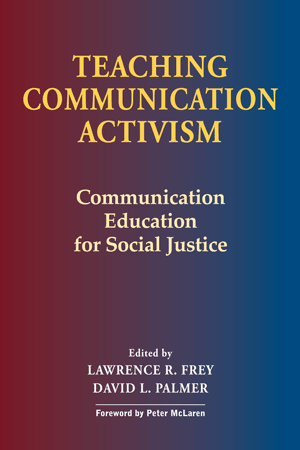Teaching Communication Activism: Communication Education for Social Justice | |
|  | Quantity in Basket:none
Code: 978-1-61289-134-7
Price:$125.00
Title: Teaching Communication Activism
Sub-title: Communication Education for Social Justice
Editor(s): Lawrence R. Frey and David L. Palmer
Publish Date: February 2014
Format: Cloth
| |
| Education remains the best hope for addressing the significant social injustices that dominate society. Few educators, however, focus on social justice directly, and even when they do, typically, they make students aware of injustice but they do not teach students how to do something about it.
This book introduces a unique form of education—communication activism pedagogy (CAP)—that involves communication educators teaching students how to use their communication knowledge and skills to intervene with community partners to promote social justice. After explains CAP’s foundations (its principles and practices, and how they differ from corporate education, extend critical pedagogy, rely on ethical imperatives, and demand a corresponding social justice activism service-learning approach), the text showcases examples of how communication educators have taught students to intervene to confront social justice issues that include gender inequality and violence, ethnic and racial prejudice and discrimination, corporate environmental colonization, and health disparities and energy issues affecting those who live in poverty.
The chapters reveal both the benefits of and challenges involved in this new and important form of pedagogy that moves students from being disconnected citizens to engaged change agents promoting social justice.
Contents: Foreword, Peter McLaren. Introduction: Teaching Communication Activism, Lawrence R. Frey and David L. Palmer. I: UNDERSTANDING COMMUNICATION ACTIVISM PEDAGOGY. Communication Education as Vocational Training and the Marginalization of Activist Pedagogies, David L. Palmer. Communication Activism Pedagogy: Theoretical Frameworks, Central Concepts, and Challenges. Jennifer S. Simpson. The Ethics of Teaching Communication Activism, Spoma Jovanovic. Service-Learning in the Service of Social Justice: Situating Communication Activism Pedagogy within a Typology of Service-Learning Topologies, Lori L. Britt. II: INFUSING ACTIVISM INTO COMMUNICATION COURSES. From Community Service to Democratic Education: Making (Class)room for Communication Activism, Billie Murray and Natalie Fixmer-Oraiz. Feminist Communication Activism Pedagogy—“Gender and Violence: Dominance, Resistance, and the Cultural Production of Meaning”, Suzanne Enck. Performing Advocacy: Staging Marginalized Voices, Joanne Gilbert. Ground-Truthing a Timber Sale: Teaching Environmental Communication Activism in the Mt. Hood National Forest, Christopher Carey. III: PROMOTING COMMUNICATION ACTIVISM THROUGH SERVICE-LEARNING. International Health Communication Activism: A Service-Learning Pedagogy to Promote Global Understanding, Joy L. Hart and Kandi L. Walker. Service-Learning, Intercultural Communication, and Video Production Praxis: Developing a Sustainable Program of Communication Activism with/in a Latino/a Migrant Community, Rebecca M. Kennerly (with Tyson Davis). Protecting Students’ Human Rights: Social Justice Activism Service-Learning to Prevent Bullying in Schools, E. Sam Cox and Wendy L. Geiger. IV: EXTENDING THE TEACHING OF COMMUNICATION ACTIVISM. Speaking for a Change: Using Speaking Centers to Amplify Marginalized Voices in Building Sustained Community Movements for Social Justice, Kimberly M. Cuny, Marnie Thompson, and Hemalatha P. Naidu. Alternative High School Students and Digital Storytelling: A Collaborative University-High School Social Justice Project, Catherine R. Squires and Paul W. Creager. Acting for Social Justice: Students, Prisoners, and Theatre of Testimony Performance, Claire E. Deal. Theatre for Energy Justice, Beth Osnes and Jason Bisping. About the Editors and Authors. Subject Index.
|
| |







